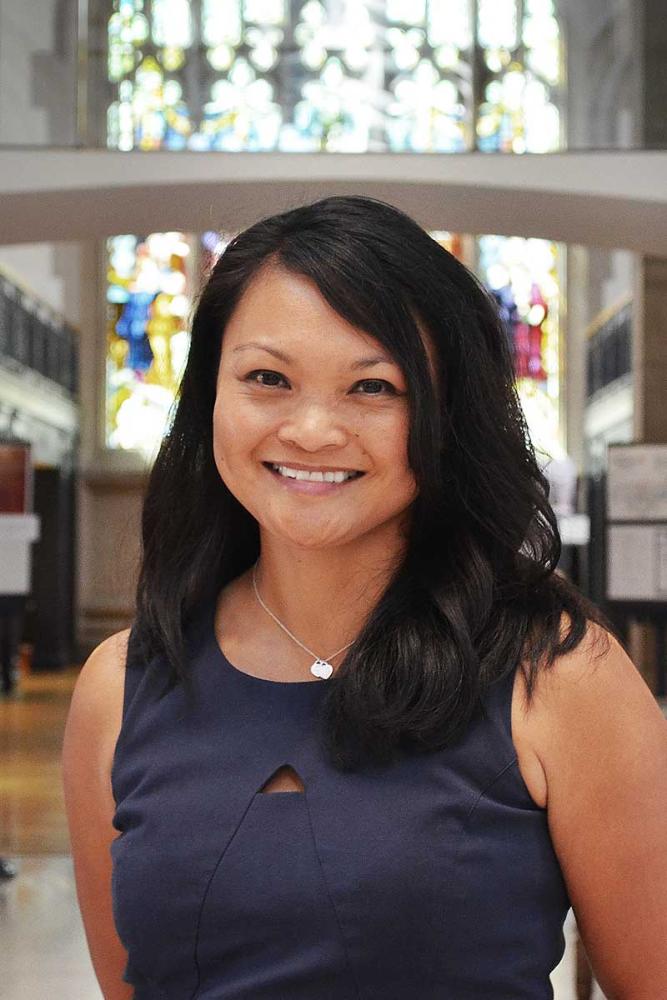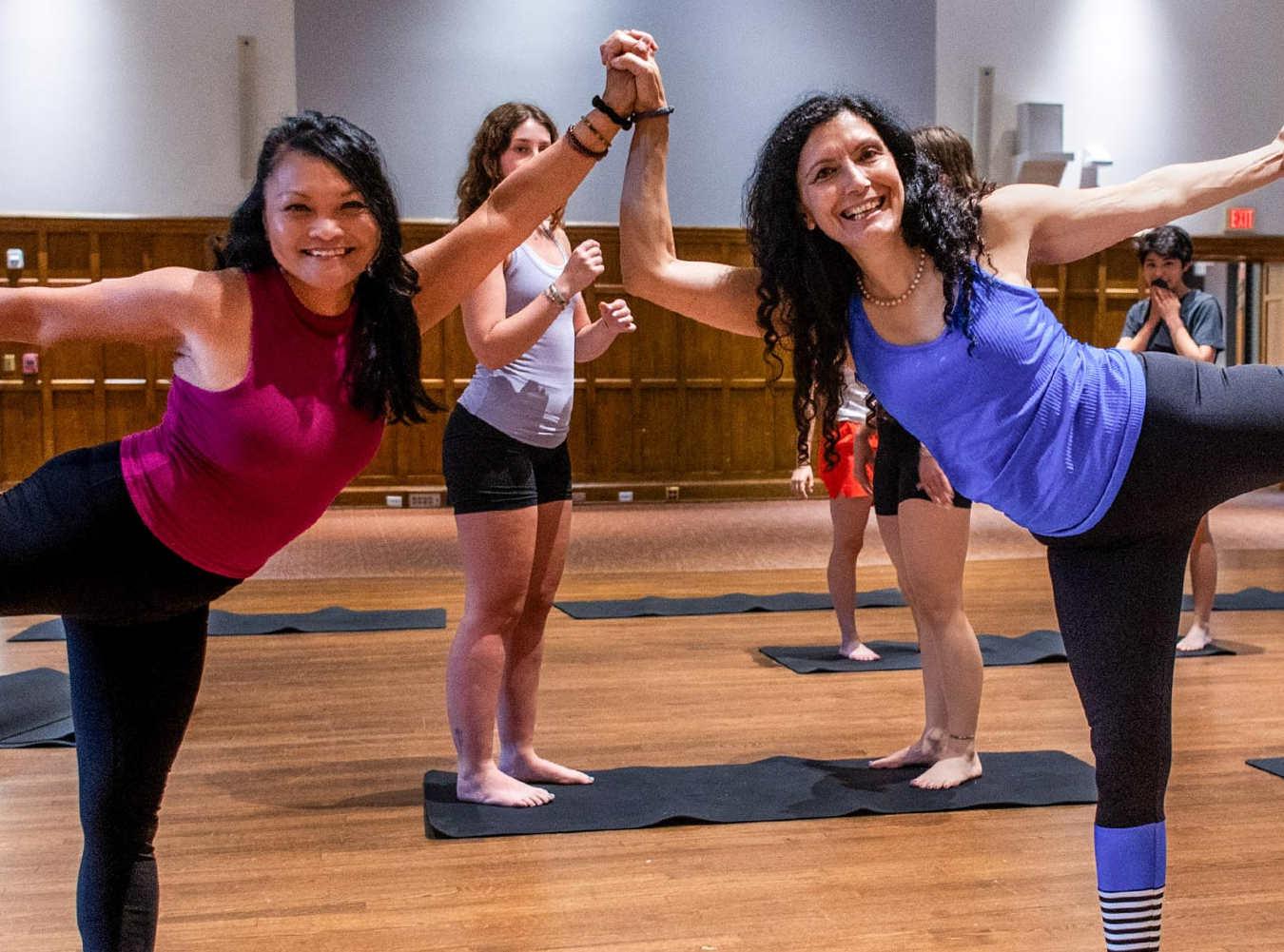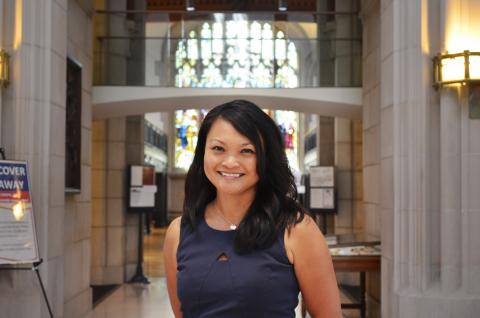Michele M. Tugade

Michele Tugade is the William R. Kenan, Jr. Endowed Chair and Professor of Psychological Science. Dr. Tugade’s research seeks to understand the psychological basis of positive emotions (gratitude, joy, love) and their role in facilitating healthy coping and resilience in the face of stress and adversity. She is the Director of The Resilience Laboratory, and shares her work with various communities through public lectures, workshops, and retreats on mental health, well-being, and mind-body wellness.
Dr. Tugade received a Ruth L. Kirschstein National Research Service Award from the National Institute of Mental Health and is an elected member of the International Society for Research on Emotions. She has worked with a number of organizations, including: NASA, Apple, The University of Global Health Equity (Rwanda, Africa), the Robert Wood Johnson Foundation, and The United Way.
Research and Academic Interests
Emotions; Resilience; Health and Well-being
Departments and Programs
Courses
PSYC 233 Health Psychology
PSYC 353 Seminar in Individual Differences and Personality
Selected Publications
Books
- Tugade, M. M., Shiota, M. L., & Kirby, L. D. (2014). Handbook of Positive Emotions. New York, NY: Guilford Press.
- Baird, A. A., Tugade, M. M., & Veague, H. B. (2008). Association for Psychological Science. Current Directions in Introductory Psychology. New York, NY: Pearson.
Journal Articles & Chapters
- Fritzson, A., Lieberman, M., & Tugade, M. M. (2017). Assessment of mood: Examining links between emotions and health. In C. Llewellyn et al. (Eds). Cambridge Handbook of Psychology, Health, and Medicine. New York, NY: Cambridge University Press. PDF
- Lieberman, M., Reed, B., & Tugade, M. M. (2017). Affective disorders: Examining assessment, treatments, and therapies in clinical and health science. In C. Llewellyn et al. (Eds). Cambridge Handbook of Psychology, Health, and Medicine. New York, NY: Cambridge University Press. PDF
- Reed, B., Hu, S., & Tugade, M. M. (2017). Building Resilience with Positive Emotions: Examining Research on Physical and Psychological Well-Being (Special Issue on Happiness). Revue Québécoise de Psychologie. PDF
- Reed, B., Hu, S., & Tugade, M. M. (2017). [Translated into French] Émotions positives et resilience: Effets des emotions positives sur le bien-être physique et phychologique. Revue Québécoise de Psychologie. PDF
- Tugade, M. M., Devlin, H. C., Fredrickson, B. L. (2016). Positive Emotions. In S. Lopez, L. Edwards, & S. Marquez (Eds.) Oxford Handbook of Positive Psychology. New York, NY: Oxford University Press.
- Kirby, L. D., Tugade, M. M., Morrow, J., Ahrens, A., & Smith, C. A. (2014). Vive la differénce: The ability to differentiate positive emotional experience and well-being. In M. M. Tugade, M. N. Shiota, & L. D. Kirby (Eds.) Handbook of Positive Emotions. New York, NY: Guilford Press.
- Kirby, L. D., Tugade, M. M., & Shiota, M. N. (2014). The science of positive emotion: Synthesis, commentary, and future directions. In M. M. Tugade, M. N. Shiota, & L. D. Kirby (Eds.) Handbook of Positive Emotions. New York, NY: Guilford Press.
- Mitamura, C., Leu, J., Campos, B., & Tugade, M. M. (2014). Traversing affective boundaries: Examining cultural norms for positive emotions. In M. M. Tugade, M. N. Shiota, & L. D. Kirby (Eds.) Handbook of Positive Emotions. New York, NY: Guilford Press.
- Mitamura, C., Reuman, L. R., & Tugade, M. M. (2014). Resilience. In A. C. Michalos (Ed.) Encyclopedia of Quality of Life Research. New York, NY: Springer Press. PDF
- Tugade, M. M., Devlin, H. C., & Fredrickson, B. L. (2014). Infusing positive emotions into life: The broaden-and- build theory and a dual-process model of resilience. In M. M. Tugade, M. N. Shiota, & L. D. Kirby (Eds.) Handbook of Positive Emotions. New York, NY: Guilford Press.
- Tugade, M. M., Shiota, M. N., & Kirby, L. D. (2014). The science of positive emotion: An overview. In M. M. Tugade, M. N. Shiota, & L. D. Kirby (Eds.) Handbook of Positive Emotions. New York, NY: Guilford Press.
- Reuman, L. R., Mitamura, C., & Tugade, M. M. (2013). Coping: An application of positive psychological constructs to disability. In M. L. Wehmeyer (Ed.) The Oxford Handbook of Positive Psychology and Disability. New York, NY: Oxford University Press. PDF
- Conway, A. M., Tugade, M. M., Catalino, L., & Fredrickson, B. L. (2012). The Broaden-and-Build theory of positive emotions: Form, function and mechanisms. In J. Vitterso (Ed.) Oxford Handbook of Happiness. New York, NY: Oxford University Press. PDF
- Tugade, M. M. (2011). Positive emotions, coping, & resilience. In S.Folkman (Ed.) Oxford Handbook of Stress, Health, and Coping (pp. 186 – 199). New York, NY: Oxford University Press.
- Tugade, M. M. (2009). Barbara Fredrickson (Biographical entry). In S. J. Lopez (Ed.) Encyclopedia of Positive Psychology. London: Blackwell Publishing.
- Waugh, C., Tugade, M. M., & Fredrickson, B. L. (2008). Psychophysiology of resilience. In B. J. Lukey & V. Tepe (Eds.) Biobehavioral Resilience to Stress (pp. 117 – 138). New York, NY: Taylor & Francis. <
- Tugade, M. M., Conner, T., & Barrett, L. F. (2007). Assessment of mood. In S. Ayers, A. Baum, C. McManus, S. Newman, K. Wallston, J.Weinman, and R. West (Eds.), The Cambridge Handbook of Psychology, Health, and Medicine (2nd Edition). New York, NY: Cambridge. PDF
- Tugade, M. M., & Fredrickson, B. L. (2007). Regulation of positive emotions: Emotion regulation strategies that promote resilience. Journal of Happiness Studies: Special Issue on Emotion Self-Regulation, 8, 311 – 333. PDF
- Conner, T.S., Barrett, L. F., Tugade, M. M. & Tennen, H. (2007). Idiographic personality: The theory and practice of experience sampling. In R. W. Robins, R. C. Fraley, & R. Kreuger (Eds.), Handbook of Research Methods in Personality Psychology (pp.79 – 98). New York, NY: Guilford Press. PDF
- Chang, E. C., Tugade, M. M., & Asakawa, K. (2006). Stress, appraisals, and coping among Asian Americans: Lazarus and Folkman’s model and beyond. In C. Scott and P. T. Wong (Eds.) Handbook of Multicultural Perspectives on Stress and Coping. International and Cultural Psychology Series. (pp. 439-455). Dallas, TX: Spring Publications. PDF
- Barrett, L. F., Tugade, M. M., & Engle, R. (2004). Individual differences in working memory capacity and dual-process theories of the mind. Psychological Bulletin, 130, 553 – 573. PDF
- Tugade, M. M. & Fredrickson, B. L. (2004). Resilient individuals use positive emotions to bounce back from negative emotional experiences. Journal of Personality and Social Psychology, 86, 320 – 333. PDF
- Tugade, M. M., Fredrickson, B. L., & Barrett, L. F. (2004). Psychological resilience and emotional granularity: Examining the benefits of positive emotions on coping and health. Journal of Personality, 72, 1161 – 1190. PDF
- Tugade, M. M. & Fredrickson, B. L. (2004). Emotions: Positive emotions and health. In N. Anderson (Ed.), Encyclopedia of health and behavior (pp. 306 – 310). Thousand Oaks, CA: Sage.
- Conner, T., Barrett, L. F., & Tugade, M. M. (2004). Ecological momentary assessment. In N. Anderson (Ed.), Encyclopedia of health and behavior (pp. 291 – 292). Thousand Oaks, CA: Sage.
- Fredrickson, B. L., Tugade, M. M., Waugh, C. E., & Larkin, G. (2003). What good are positive emotions in crises?: A prospective study of resilience and emotions following the terrorist attacks on the United States on September 11th, 2001. Journal of Personality and Social Psychology, 84, 365 – 376. PDF
- Tugade, M. M. & Fredrickson, B. L. (2002). Positive emotions and emotional intelligence. In Barrett, L. F. & Salovey, P. (Eds.) The wisdom of feelings: Psychological processes in emotional intelligence (pp. 319 – 340). New York, NY: Guilford Press. PDF
- Fredrickson, B. L., Mancuso, R. A., Branigan, C., & Tugade, M. M. (2000). The undoing effect of positive emotions. Motivation and Emotion, 24, 237 – 257. PDF

